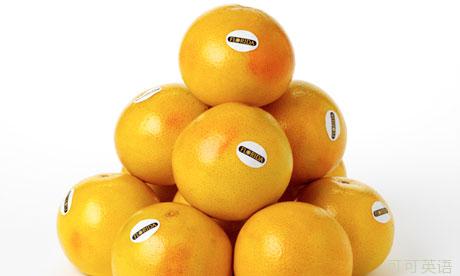
We're always being told by the Department of Health to eat five portions of fruit and vegetables a day. But it's not clear where the evidence for this comes from and a large study by the European Prospective Investigation Into Cancer and Nutrition (Epic) two years ago of the dietary intake of more than 400,000 people found only a weak link between eating fruit and vegetables and a reduction in overall cancer risk. There's no evidence it reduces breast or prostate cancer.
我們總是被健康部門告知一天要吃五份水果和蔬菜。但這不清楚這項結(jié)論來自于何方,一個由歐洲癌癥與營養(yǎng)前瞻性調(diào)查(Epic)兩年前對超過40萬人的飲食攝入量的大型研究發(fā)現(xiàn)食用水果和蔬菜與降低整體罹患癌癥的風(fēng)險之間只有微弱的聯(lián)系。沒有證據(jù)表明它可以減少乳腺癌或前列腺癌的幾率。
Even so, how could anyone argue against eating more fruit and vegetables? Well, it depends what fruit you're eating. A review article in the Canadian Medical Association Journal warns that a chemical in grapefruits can interact lethally with certain medicines. Even apple juice, the staple of many breakfast tables, may reduce our absorption of some drugs. Parents also often think fruit juice is a healthy alternative to fizzy drinks but juices contain sugar and calories too – as much as a glass of Coke (160 calories) – so should be drunk in moderation.
即便如此,怎么會有人反對吃更多的水果和蔬菜呢?好吧,這取決于你在吃什么水果。加拿大醫(yī)學(xué)協(xié)會雜志上的一篇評論文章警告稱葡萄柚中的一種化學(xué)物質(zhì)可以與某些藥物相互反應(yīng)而致命。甚至蘋果汁,許多早餐中的主食,可能會減少我們對一些藥物的吸收。父母也常常認(rèn)為果汁是碳酸飲料的健康替代但果汁也含有糖分和卡路里——高達一杯可口可樂的熱量(160卡路里),所以應(yīng)該適度引用。
Grapefruit has also been linked to an increase in breast cancer. A study in the British Journal of Cancer (BJC) of 500,000 post-menopausal women found that eating a quarter of the fruit a day increased the risk by 30%.
葡萄柚也與乳腺癌的增加有關(guān)。《英國癌癥雜志》(BJC) 對50萬名絕經(jīng)后的婦女的一項研究發(fā)現(xiàn)一天吃四分之一的水果使幾率提高了30%。
The solution
解決方法
There is one good reason for not eating grapefruits – they taste sour. But they are unlikely to increase your risk of breast cancer: further research in the BJC showed no increase of breast cancer in pre- or post-menopausal women who tuck into grapefruits or drink juice.
有一個好的理由不吃葡萄柚——他們吃起來很酸。但它們不太可能增加患乳腺癌的風(fēng)險: 《英國癌癥雜志》 進一步的調(diào)查顯示沒有增加那些絕經(jīng)前后海吃葡萄柚或海喝果汁的婦女患乳腺癌的幾率。
Grapefruit contains a type of chemical called furanocoumarin (also found in seville oranges and limes but not valencia or other sweet oranges), which, by inhibiting the enzyme CYP3A4, stops the breakdown of some prescription drugs.
葡萄柚含有一種叫做furanocoumarin的化學(xué)物質(zhì)(還發(fā)現(xiàn)在塞維利亞橘子和酸橙中但不是瓦倫西亞或其他甜橙),通過抑制CYP3A4這種酶可以阻止一些處方藥的分解。
So the concentrations of these drugs rise and can have serious side-effects, including kidney damage, heart block, and deep vein thrombosis (which occurred when an oral contraceptive was taken by a woman who also ate grapefruit three days in a row).
所以這些藥物的濃度上升會產(chǎn)生嚴(yán)重的副作用,包括腎臟損害、心肌梗死和深靜脈血栓形成(這發(fā)生在一個女人口服避孕藥的同時也連續(xù)三天吃著葡萄柚的時候)。
Patient information leaflets should tell you what foods to avoid with which drugs. If in doubt, ask your doctor. So you don't need to eat less fruit, and may still need to eat more. Another paper from the Epic study found a 22% reduction in deaths from heart attacks in people who ate eight portions of fruit and vegetables a day compared to those who ate three or fewer. The way the study is designed, however, means that it can only suggest a link – it can't prove one.
病人須知應(yīng)該告訴你吃藥時要避免與什么食物一起食用。如果有疑問,問你的醫(yī)生。所以你不需要少吃水果,可能仍然需要多吃。Epic研究的另一篇論文發(fā)現(xiàn)心臟病人一天吃八份水果和蔬菜與每天吃三份或更少相比降低了22%的死亡率。然而這項研究的設(shè)計方法意味著它只是暗示了這種聯(lián)系,但不能證明。












